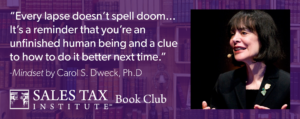Sales Tax Institute Book Club: Mindset: The New Psychology of Success by Carol S. Dweck
How much control do you have over your success? The Sales Tax Institute Book Club’s latest read is an informative and inspirational look into how our attitudes can impact our success. Mindset: The New Psychology of Success by Carol S. Dweck, Ph.D. provides theories and examples for how one’s outlook on life can maximize (or minimize) their potential.
The author of Mindset, Carol S. Dweck, is a highly accomplished psychologist in addition to being a bestselling author. A professor at Stanford University, Dweck is a leading figure in studying developmental and social psychology. She has addressed the United Nations as well as being featured on major television programs.
After reading independently and discussing in-person, here’s what our team took away from Mindset.

What are the two mindsets?
Mindset begins with Dweck defining two different mindsets: the fixed mindset and the growth mindset. Someone with a fixed mindset believes that their qualities are unchangeable. People with fixed mindsets thrive with routine and structure. Fixed mindsets are often comfortable, but do they allow for the fulfillment of potential?
On the other hand, someone with a growth mindset believes that they can improve through their own efforts and help from others. Believing that desired qualities can be improved creates a love for learning. When the inherent resistance to new options, new ideas, and new paths is removed, people are more agile in responding to change.
Mindset also explores how the two mindsets are developed during childhood. Changing the way we speak to children can foster a growth mindset. For example, the phrases “You’re smart,” and “I like how you figured that out,” sound similar, but can be interpreted in completely different ways. Telling a child they’re smart acknowledges an inherent ability, something that was always there and that is unlikely to change. On the other hand, recognizing a child’s effort and thought process fosters a growth mindset, one that sees valued skills as attainable rather than unachievable.
Dweck guides readers through these concepts by demonstrating fixed and growth mindsets in a variety of contexts. In a sports context, Dweck examines the habits of historic athletes who display radical persistence in addition to athleticism. Mindsets also play a role in interpersonal relationships. For spouses, parents, and friends, the growth mindset shatters the idea that a great relationship should require no effort.
This isn’t to say that one mindset is always better than the other. Different mindsets can be valuable in different situations, and many people often have different mindsets for different parts of their lives. Mindset encourages readers to examine their own habits and learn where their mindsets are most effective.

What did our team learn?
Our team discussed how mindsets can play a role in the business world. Just like in sports or relationships, being aware of our attitudes can prepare us for a career in sales tax.
As sales tax professionals, we must constantly be prepared for changes to our practice. Whether that’s a groundbreaking technology that can streamline our work or a Supreme Court case that alters everything, we must be resilient. We can better respond to such changes when we have a growth mindset. To keep up with new developments, sales tax professionals find the most success if they have a love of learning.
There are certain practices that can foster a growth mindset. For example, creating a concrete plan can lead to greater efficiency and success. When someone makes a structured plan with objectives, tactics, and deadlines, our goals seem more process-oriented, and therefore, achievable.
In such a detail-oriented field, our team constantly makes detailed schedules and workflows to collaborate with greater productivity. From the various systems of filing specific returns to the countless resources used every day, detailed plans help our team achieve the greatest possible success.
Yet, changing from a fixed to a growth mindset is less about behavior change and more about attitude change. We can view our successes not as the product of luck, chance, or natural skill, but as the culmination of hard work. With a growth mindset, we can better acknowledge our own effort and our co-workers’ accomplishments, creating a welcoming and productive environment for all.
Do you have a fixed or a growth mindset? How has your mindset impacted your work? If you have thoughts on Mindset: The New Psychology of Success, email us here!
Want to join in? The Sales Tax Institute Book Club’s next read is Productivity for How You’re Wired: Better Work, Better Life by Ellen Faye. We encourage you to pick up a copy at your local independent bookstore. Our neighborhood bookstore is Sandmeyer’s Bookstore in historic Printer’s Row, Chicago.